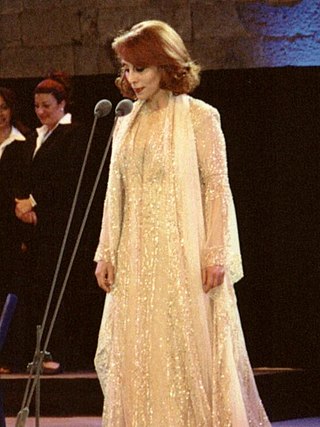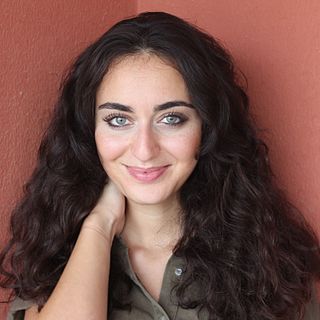
Syria's estimated pre–Syrian Civil War 2011 population was 22 ±.5 million permanent inhabitants, which included 21,124,000 Syrians, as well as 1.3 million Iraqi refugees and over 500,000 Palestinian refugees. The war makes an accurate count of the Syrian population difficult, as the numbers of Syrian refugees, internally displaced Syrians and casualty numbers are in flux. The CIA World Factbook showed an estimated 20.4m people as of July 2021. Of the pre-war population, six million are refugees outside the country, seven million are internally displaced, three million live in rebel-held territory, and two million live in the Kurdish-ruled Autonomous Administration of North and East Syria.

Arabic music is the music of the Arab world with all its diverse music styles and genres. Arabic countries have many rich and varied styles of music and also many linguistic dialects, with each country and region having their own traditional music.

The music of Palestine is one of many regional subgenres of Arabic music. While it shares much in common with Arabic music, both structurally and instrumentally, there are musical forms and subject matter that are distinctively Palestinian.
When speaking of the music of Syria, it is important to remember that there are certain musical traditions and practices that have been present in Syria longer than others. There have been musical influences introduced into Syria through multiple eras of conquest and influences from surrounding cultures in modern-day Syria. Lying near Egypt and Israel, and connected to southern Europe by the Mediterranean, Syria became host to many distinct cultural musics through trade and route. The music present in Syria is related greatly to poetry, influenced greatly by the Bedouin nomadic tribes, the maqam system in Arabic classical music, as well as influenced greatly by the geopolitical movement and conflict in the Middle East. Syrian music generally has a singer who is accompanied by three or four instruments. The texture is usually thin but can become denser depending on the use of each instrument. Music is tightly linked to poetry in Syria.

The golden hamster or Syrian hamster is a rodent belonging to the hamster subfamily, Cricetinae. Their natural geographical range is in an arid region of northern Syria and southern Turkey. Their numbers have been declining in the wild due to a loss of habitat from agriculture and deliberate elimination by humans. Thus, wild golden hamsters are now considered endangered by the International Union for Conservation of Nature. However, captive breeding programs are well-established, and captive-bred golden hamsters are often kept as small house pets. They are also used as scientific research animals.

Nouhad Wadie Haddad, known as Fairuz, is a Lebanese singer. She is widely considered an iconic vocalist and one of the most celebrated singers in the history of the Arab world. She is popularly known as the "The bird of the East," "the cedar of Lebanon," "the moon's neighbor" among others.

"Mawṭinī" is an Arabic national poem by the Palestinian poet Ibrahim Tuqan, composed by the Lebanese musician Mohammed Flayfel in 1934, and is popular patriotic song among the Arab people.

Sabah al-Din Abu Qaws, also known as Sabah Fakhri, was a Syrian tenor singer from Aleppo.
Shams, an Arabic word meaning sun or spark may refer to:
Arabic hip-hop is a segment of hip hop music performed in the Arabic-speaking world. Due to variety of dialects and local genres which exist in the localities, Arabic hip-hop music may appear very diverse depending on the country of the song. Like most artists of the genre, the hip-hop artists from the Arabic-speaking world are highly influenced by American hip-hop.

Syria Mosque was a 3,700-seat performance venue located in the Oakland neighborhood of Pittsburgh, Pennsylvania. Constructed in 1911 and dedicated on October 26, 1916, the building was originally built as a "mystical" shrine for the Ancient Arabic Order of the Nobles of the Mystic Shrine and designed by Huehl, Schmidt & Holmes architectural firm of Chicago. It was recognized as one of the best examples of Exotic Revival architecture.

Kinan Azmeh, is a Syrian clarinet player and composer of contemporary classical music based in New York City. Performing with orchestras such as the New York Philharmonic, the Seattle Symphony, the Bavarian Radio Symphony Orchestra, the West–Eastern Divan Orchestra, or the Syrian Symphony Orchestra, he has played as a soloist of classical works as well as of contemporary compositions.

Hewar is a jazz fusion band from Syria, formed in 2003. The band and its members are mainly known for their three CDs and concerts in the Middle East, Europe, Asia and the US. Further, founding members Kinan Azmeh, Dima Orsho and Issam Rafea have performed and recorded their compositions inspired by Western and Arabic traditions as well as jazz influences with other Middle Eastern and European musicians.
Mohamed Mustapha Ali Masfaka, better known as Abu Ratib, is a Syrian Nasheed singer of Islamic and Arabic music based on classical Arab poetry.
Syrian Australians are Australians of Syrian descent or Syria-born people who reside in the Commonwealth of Australia. Australian Syrians make up 0.4 percent of the Australian population, with a gender split of 51.3 percent female, 49.7 percent male. The 2016 Australian census revealed 68.8 percent of Syrian Australian homes have Arabic as the language spoken at home, however of the homes where English is not the first spoken language, 37.7 percent are able to speak English fluently. The majority of Syrian Australians arrived prior to 2007, with a small group immigrating between 2007–2011 then a larger group entering between 2012–2016.
The Syrian National Orchestra for Arabic Music was a Syrian orchestra dedicated to the performance of classical Arabic music, as well as experimental work based on traditional music from the Middle East. The orchestra played regular concerts in the Damascus Opera House since its opening in 2004. Due to the ongoing Syrian civil war, most of its members, like its principal conductor and oud virtuoso Issam Rafea, or Moslem Rahal, a notable ney player, have left Syria for exile in Europe, the US or other countries.

Faia Younan is an Syrian-Assyrian singer, considered the first Middle Eastern artist ever to crowdfund her debut.

Arab folk dances, also referred to as Oriental dance, Middle-Eastern dance and Eastern dance, are the traditional folk dances of the Arabs in Arab world. Arab dance has many different styles, including the three main types of folklore, classical, and contemporary. It is enjoyed and implemented throughout the Arab region, from North Africa to the Middle East.

Shamstep is a Middle-Eastern genre of electronic dance music that combines the traditional forms of Dabke music with electronic instruments. 'Sham' is the Arabic name for the region of Greater Syria, Syria-Palestine or the Levant. The term 'Shamstep' was coined by the Jordanian-Palestinian band 47Soul to describe their music.
Issam Rafea, also written Essam Rafea, is a Syrian musician, music director and composer, noted for his compositions and performances on the Arabic oud, as former director of the Syrian National Orchestra for Arabic Music and for his collaboration with jazz and world music bands. Since 2013, Rafea has lived in Chicago, touring in the US as well as internationally.













